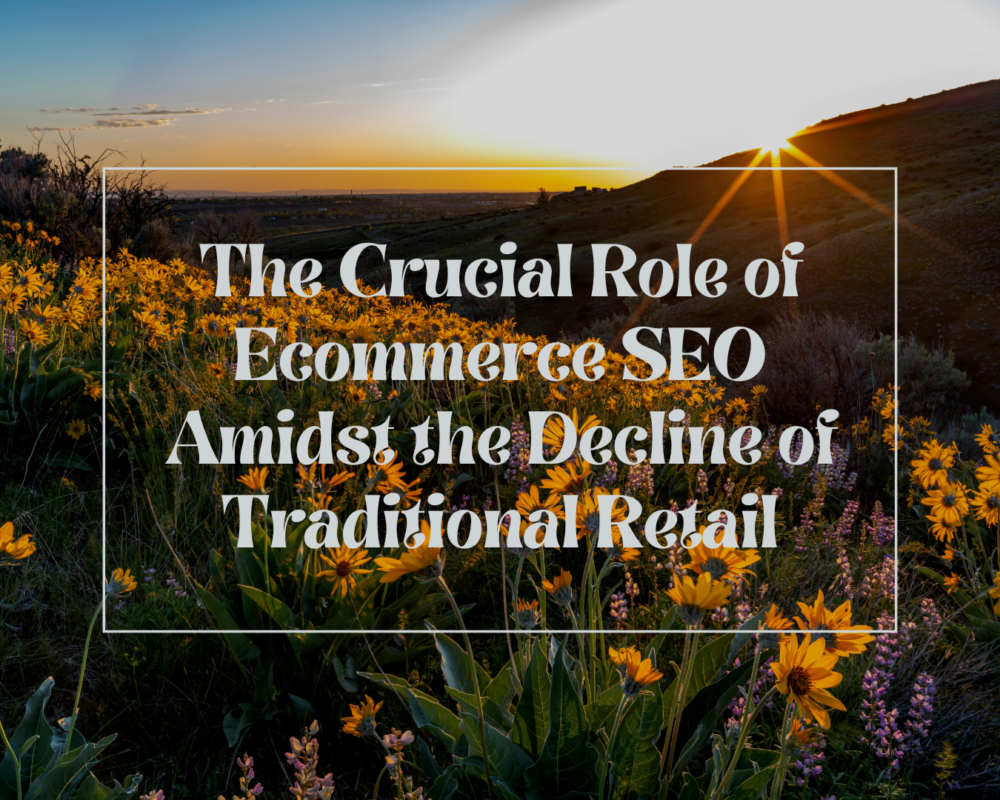The Changing Retail Landscape
The retail landscape is undergoing a profound transformation. The rise of ecommerce and the corresponding decline of traditional brick-and-mortar stores have created a new business environment where adaptability is key for survival and success. For ecommerce businesses, mastering ecommerce SEO (Search Engine Optimization) has become essential to remain competitive. This blog post delves into the decline of traditional retail, the rise of ecommerce, and the critical importance of ecommerce SEO for modern businesses.
The Decline of Traditional Retail
Factors Accelerating the Decline
Once bustling malls and big-box stores are now facing a stark reality. The shift from physical retail to online shopping has been accelerated by various factors, including the COVID-19 pandemic, changing consumer behaviors, and advancements in technology. The pandemic, in particular, has dramatically altered shopping habits, pushing more consumers to shop online due to lockdowns and social distancing measures. Even as restrictions eased, many have retained the convenience of online shopping.
The Impact on Traditional Retailers
The decline of traditional retail has had a significant impact on retailers, both large and small. Many iconic brands that once dominated the retail landscape have filed for bankruptcy or closed thousands of stores in recent years. Traditional retailers are struggling to keep up with the lower costs and convenience offered by ecommerce. With fewer customers visiting physical stores, they are experiencing declining sales and profits, leading to widespread store closures and layoffs. The shift to online shopping has also resulted in oversaturated markets, fierce competition, and price wars, making it even more challenging for traditional retailers to survive. The demise of well-known retail giants such as 99 Cents Only Stores, which recently filed for Chapter 11 bankruptcy, and Express Clothing Brand, highlights the challenges faced by traditional retailers. Store closures, reduced foot traffic, and declining sales are all indicators of this downward trend. According to a report by Coresight Research, U.S. retailers announced plans to close over 8,000 stores in 2020 alone. This represents a significant shift in the retail landscape, marking the end of an era for many physical stores.
The Rise of Ecommerce and Its Impact on the Retail Industry
Growth of Ecommerce
In contrast, ecommerce is flourishing. The ease of shopping from home, coupled with the ability to compare prices and read reviews, has made online shopping increasingly popular. Ecommerce sales worldwide are projected to reach $6.54 trillion by 2023, up from $3.53 trillion in 2019, according to Statista. This exponential growth underscores the significant shift in consumer behavior towards online shopping.
Transformation of the Retail Industry
This shift has not only transformed consumer behavior but also reshaped the entire retail industry. Traditional retailers are now investing heavily in their online presence, and new ecommerce businesses are emerging to meet the growing demand. The digital marketplace offers opportunities for businesses to reach a global audience, operate with lower overhead costs, and utilize data analytics to optimize their strategies.
The Importance of Ecommerce SEO in Staying Competitive
What is Ecommerce SEO?
Ecommerce SEO involves optimizing an online store to rank higher in search engine results pages (SERPs). It encompasses various strategies and techniques aimed at improving the visibility, credibility, and usability of an ecommerce website. Unlike traditional SEO, which primarily focuses on content, ecommerce SEO requires a comprehensive approach that includes optimizing product pages, category pages, and images to ensure they rank well in search results.
Differences from Traditional SEO
While traditional SEO focuses on optimizing content for search engines, ecommerce SEO goes a step further. It involves optimizing product pages, category pages, and even images to ensure they rank well in search results. Additionally, ecommerce SEO requires a strong focus on user experience, as factors such as site speed, mobile responsiveness, and navigation play a crucial role in determining search rankings. This dual focus on search engine optimization and user experience is what sets ecommerce SEO apart and makes it essential for online retailers.
Why Ecommerce SEO is Crucial for Modern Businesses
Benefits of Ecommerce SEO
Increased Visibility and Brand Awareness
Ranking higher in search results means more people will see your website. This increased visibility leads to greater brand awareness, helping you reach a broader audience and establish your brand as an industry leader.
Higher Search Engine Rankings
By implementing effective SEO strategies, you can improve your website’s rankings on search engines like Google. Higher rankings translate to more organic traffic, which is essential for driving sales and growth.
More Traffic to Your Website
Higher search engine rankings lead to increased organic traffic. By attracting more visitors to your site, you have more opportunities to convert them into paying customers. This organic traffic is highly valuable, as it tends to be more targeted and engaged compared to other traffic sources.
Better Online Presence and Credibility
A well-optimized website not only ranks higher but also appears more credible to users. High-quality content, user-friendly design, and a seamless shopping experience all contribute to building trust with your audience.
Improved User Experience
Ecommerce SEO goes beyond keywords and backlinks. It focuses on creating a positive user experience, which is critical for retaining customers and encouraging repeat business. Key aspects of user experience optimization include:
Key Aspects of Ecommerce SEO
Fast Loading Speed and Mobile Responsiveness
In today’s fast-paced world, users expect websites to load quickly. A slow-loading site can result in high bounce rates and lost sales. Ensuring your website is mobile-responsive is equally important, as more people are shopping on their smartphones and tablets.
User-Friendly Navigation and Site Structure
A well-organized website with intuitive navigation makes it easy for users to find what they’re looking for. This not only enhances the shopping experience but also helps search engines crawl and index your site more effectively.
High-Quality Content
Content is king in the world of SEO. Providing valuable, informative, and engaging content not only helps with search engine rankings but also keeps users coming back for more. High-quality product descriptions, blog posts, and guides can set your ecommerce business apart from the competition.
Implementing Ecommerce SEO Strategies
Keyword Research
Conduct thorough keyword research to identify terms and phrases your target audience uses when searching for products you offer. This includes short-tail keywords, long-tail keywords, and localized keywords. Tools like Google Keyword Planner, SEMrush, and Ahrefs can assist in finding relevant keywords with high search volume and low competition.
On-Page SEO
Optimize product pages, category pages, and other relevant sections of your website. This includes using targeted keywords in titles, meta descriptions, headers, and content. Ensure that product descriptions are detailed and include relevant keywords naturally. Incorporate high-quality images and optimize them with alt text for better search engine visibility.
Technical SEO
Focus on the technical aspects of your website to improve search engine crawlability and user experience. This includes optimizing site speed, ensuring mobile responsiveness, using HTTPS for security, and creating an XML sitemap. Structured data markup can help search engines understand your content better and improve the chances of appearing in rich snippets.
Content Marketing
Develop a content marketing strategy that includes creating blog posts, guides, videos, and other forms of content that provide value to your audience. This not only helps with SEO but also positions your brand as an authority in your niche. Share your content on social media and other platforms to increase visibility and attract backlinks.
Link Building
Build high-quality backlinks to your website from reputable sources. This can be achieved through guest blogging, influencer collaborations, and creating shareable content. Backlinks are a crucial ranking factor and can significantly improve your website’s authority and search engine rankings.

Measuring the Success of Ecommerce SEO
Analytics and Reporting
Use tools like Google Analytics, Google Search Console, and third-party SEO software to track your website’s performance. Monitor key metrics such as organic traffic, bounce rate, conversion rate, and keyword rankings. Regularly analyze this data to identify areas for improvement and adjust your SEO strategy accordingly.
Continuous Improvement
Ecommerce SEO is not a one-time effort but an ongoing process. Stay updated with the latest SEO trends and algorithm changes. Continuously optimize your website, create fresh content, and build new backlinks to maintain and improve your search engine rankings.
Elevate Your Ecommerce Strategy with SEO
The decline of traditional retail and the rise of ecommerce present both challenges and opportunities for businesses. To stay competitive in this digital landscape, mastering ecommerce SEO is crucial. By optimizing your website for search engines and focusing on user experience, you can increase visibility, drive more traffic, and ultimately boost sales.
The Future of Retail: A Hybrid Model
As the retail landscape continues to evolve, a hybrid model that integrates both online and offline experiences is likely to emerge. Traditional retailers who successfully adapt to this new reality by embracing digital transformation and leveraging ecommerce SEO will have a competitive edge. This hybrid approach not only caters to the convenience and efficiency of online shopping but also retains the tangible and personal experiences that physical stores can offer.
Embrace Change and Thrive
The retail industry is at a crossroads, with ecommerce rapidly gaining ground over traditional retail. To thrive in this dynamic environment, businesses must prioritize ecommerce SEO. By doing so, they can enhance their online presence, attract more targeted traffic, and drive higher sales. The shift from traditional to digital is not just a trend but a fundamental change in consumer behavior and business operations. Embrace this change, optimize your ecommerce strategies, and secure your place in the future of retail. With the right approach, your business can navigate the challenges of this transition and emerge stronger and more resilient.
Practical Tips for Ecommerce SEO
To further enhance your ecommerce SEO efforts, consider the following practical tips:
Optimize Product Listings
- Ensure your product titles and descriptions are clear, detailed, and keyword-rich.
- Use high-quality images and include alt text with relevant keywords.
- Implement customer reviews and ratings to build trust and improve SEO.
Leverage Social Media
- Share your products and content on social media platforms to drive traffic.
- Engage with your audience and respond to their queries and feedback.
- Use social media analytics to understand your audience’s preferences and tailor your content accordingly.
Utilize Email Marketing
- Build an email list and send regular updates, promotions, and product recommendations.
- Personalize your emails based on customer behavior and preferences.
- Include links to your website and optimize email content for search engines.
Focus on Local SEO
- Optimize your ecommerce site for local search if you have a physical presence or target local customers.
- Use local keywords, create Google My Business listings, and encourage customer reviews.
Invest in Paid Advertising
- Complement your SEO efforts with paid advertising on search engines and social media.
- Use targeted ads to reach specific customer segments and drive more traffic to your site.
By implementing these strategies and continuously refining your approach, you can maximize the benefits of ecommerce SEO and ensure your business thrives in the digital marketplace. Are you ready to transform your ecommerce business and stay ahead of the competition? Call us today at (208) 639-9867 or visit our website at www.idaho-style.com.











